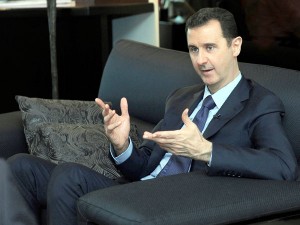Assad vows to hand over chemical weapons ahead of US-Russia talks

In this Monday, Aug. 26, 2013 file photo released by the Syrian official news agency SANA, Syrian President Bashar Assad gestures as he speaks during an interview with a Russian newspaper, in Damascus, Syria. yria will subject its chemical weapons to international monitoring because of Russia, not because of threats made by the United States, Syrian President Bashar al-Assad said in an interview with Rossiya 24. (AP Photo/SANA, File)
GENEVA — President Bashar al-Assad vowed to hand over Syria’s chemical weapons Thursday as Moscow and Washington were set to begin high-stakes talks on a Russian plan to avert US-led military action against his regime.
Speaking to Russian television, Assad said Syria would place its chemical weapons under foreign control in line with Moscow’s proposal.
“Syria is handing over chemical weapons under international control because of Russia,” Assad was quoted as telling Rossiya 24 state news channel.
“US threats have not affected the decision,” he said, adding that Syria planned to file documents to the United Nations to sign an agreement on chemical arms.
Assad’s move came as the US and Russia prepared to meet in Geneva for talks on the proposal for Syria to open its doors to inspectors and eliminate its chemical weapons.
Article continues after this advertisementBacked by a large team of experts, US Secretary of State John Kerry was to meet Russian Foreign Minister Sergei Lavrov.
Article continues after this advertisementOfficials from the two countries were to pore over Moscow’s plan — an 11th-hour proposal that led US President Barack Obama to put off threatened US military action against the Syrian regime.
Washington wants to see if Assad is serious about putting his chemical weapons stockpile under international control, amid allegations the regime used sarin gas in an attack near Damascus last month.
Ahead of the talks, a senior US official said Washington was urging Syria to “declare all of their stockpile quickly.”
The official said Washington would be asking for specific action from Damascus to test the regime’s sincerity and discussing the “different modalities” of destroying Assad’s chemical weapons and production facilities.
“It’s doable, but difficult,” the official said.
Lavrov voiced optimism ahead of the talks, saying during a visit to Kazakhstan: “I am sure that there is a chance for peace in Syria… We cannot let it slip away.”
In a speech quoted by Russian news agencies, Lavrov said he was prepared to “ensure Syria’s adherence to the chemical weapon ban convention.”
The United States and its main backer of military strikes on Syria France have warned they will not allow the chemical weapons plan to become a delaying tactic in Syria’s brutal war, saying the threat of military force remains on the table.
Revealing details of the Russian proposal for the first time Thursday, daily Kommersant said Moscow had given Washington a four-step plan for the weapons handover.
Quoting a Russian diplomatic source, Kommersant said the plan would see Damascus join the Organisation for the Prohibition of Chemical Weapons (OPCW), declare the locations of its chemical arms, allow OPCW inspectors access and finally arrange for destruction of the arsenal.
Syria’s opposition has denounced the plan, warning it will only lead to more deaths in a conflict that has already killed more than 110,000 people since March 2011.
The commander of the Free Syrian Army, Selim Idriss, said in a video posted on YouTube that the rebels categorically rejected the Russian initiative.
And the Syrian National Coalition opposition group said the plan is a “political maneuver aimed at buying time” for Assad and would be a “green light” to other regimes to use chemical weapons.
Russian President Vladimir Putin meanwhile made an unusual personal appeal to the American people to reject military action, in an opinion piece in the New York Times.
“A strike would increase violence and unleash a new wave of terrorism,” Putin wrote. “It could throw the entire system of international law and order out of balance.”
Putin welcomed US willingness to consider the Moscow initiative, but warned any strikes without the approval of the United Nations Security Council, where Moscow wields a veto, would destroy the credibility of the world body.
Russia is a traditional ally of Assad, and Moscow, backed by China, has blocked any attempt to sanction his regime through the United Nations.
The talks in Geneva were expected to last two to three days and also focus on revitalizing efforts to organize a peace conference aimed at ending Syria’s civil war.
As well as Lavrov, Kerry was due to meet UN-Arab League envoy Lakhdar Brahimi to discuss UN-backed efforts to bring the Assad regime to the table with the opposition rebels.
Western officials have claimed the sudden renewal of diplomatic efforts on Syria was the result of the military threats, but have questioned whether Assad can be trusted.
Washington alleges that some 1,400 people died in the chemical attack on August 21 and was rallying support for a military response when the Russian proposal emerged.
French Foreign Minister Laurent Fabius said Thursday that a much-awaited report by UN inspectors into the attack will “probably” be published on Monday.
“It will say that there was a chemical massacre,” Fabius told French radio.